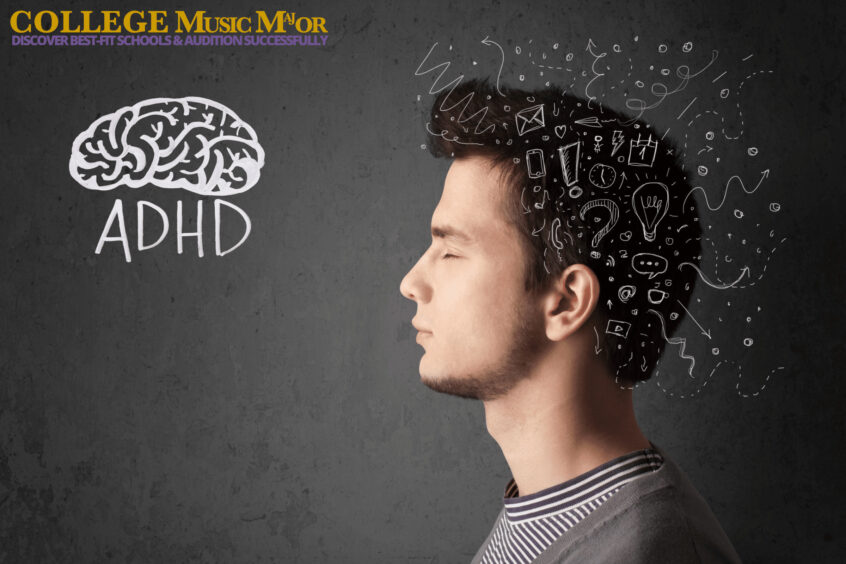Personal perspective: As the long-time director of a college degree program for students of popular music and now a music educational consultant, I have worked with many young musicians with Attention Deficit Hyperactivity Disorder (ADHD). It was so common at my college that I’d tease that we needed Ritalin in the drinking fountains for both the music students and their teachers.
I suffer from the condition myself. although “suffer” isn’t the right word. In some ways, ADD (I don’t have the hyperactivity part of the equation) has been like a superpower, allowing me to hyperfocus when I need. It certainly has been an aid in my songwriting and other creative activities, and you can find a nice article on the connection between ADHD and creativity in Scientific American.
Superpower or not, ADHD often comes at a price. Here’s one way. We ignore other things in our lives as we hyperfocus. For students, this can mean ignoring other studies as we dive deep into music. As a consequence, students who have the intelligence to thrive academically often don’t perform up to that potential.
Given that ADHD is a medical condition, the rest of this article is more formal. I just wanted to give you my personal perspective on it since I’ve spent a professional career and a personal lifetime with it.
What is ADHD
Attention Deficit Hyperactivity Disorder (ADHD) is a condition that impacts several aspects of an individual’s life, often shaping their personality, abilities, and talents in unique ways. An intriguing connection exists between ADHD and creative fields, particularly music. This article will explore this connection, demonstrating how some of the world’s most accomplished musicians have harnessed their ADHD as a catalyst for their creative expressions.
Understanding ADHD
ADHD, short for Attention Deficit Hyperactivity Disorder, is a neurological condition typically diagnosed in childhood and often persists into adulthood. The disorder is characterized by a consistent pattern of inattention, hyperactivity, and impulsivity that interferes with functioning or development.

Inattention
Inattention is a major symptom of ADHD. Individuals with ADHD often struggle to focus on tasks for extended periods, especially those that require sustained mental effort. They may also experience difficulty in organizing tasks and activities, often forgetting daily activities and overlooking details.
Hyperactivity
Hyperactivity is another common symptom associated with ADHD. Individuals with ADHD often exhibit restlessness and have difficulty remaining still for extended periods. However, it’s important to note that ADHD doesn’t always present with hyperactivity. In some cases, the “H” in ADHD is dropped to denote the absence of hyperactivity, particularly in girls and women.
Impulsive Behavior
Impulsive behavior is a defining characteristic of ADHD. People with ADHD often struggle with self-control, which can manifest in various ways, such as interrupting others, being unable to wait their turn, making hasty decisions, or engaging in risky behaviors.
ADHD is a complex disorder with no singular cause. It is believed to be influenced by a combination of genetic factors, with genetics being responsible for around 74% of the variability in ADHD diagnoses. One gene of interest in ADHD research is the DRD4 gene, specifically a variant known as DRD4-7R, which has been nicknamed the “rockstar gene” due to its association with sensation and novelty-seeking behaviors.
Treatment for ADHD
ADHD treatment often involves a multimodal approach, combining medication, psychotherapy, behavioral interventions, and lifestyle modifications. Medication for ADHD generally falls into two categories: stimulant medications (like Ritalin, Adderall, or Vyvanse) and non-stimulant medications (like Strattera, Wellbutrin, or Kapvay).
In addition to prescribed medication, some individuals with ADHD may self-medicate with mild stimulants like caffeine or nicotine to temporarily alleviate symptoms. However, it’s crucial to note that self-medication can sometimes lead to substance misuse or addiction, emphasizing the importance of professional guidance in managing ADHD symptoms.
The ADHD-Music Connection
Numerous studies have explored the link between ADHD and creativity, often showing that individuals with ADHD outperform their neurotypical peers on certain cognitive or creative tests. This increased creativity and the ability to hyperfocus on tasks of interest can result in exceptional talent in fields that value originality and intense concentration, such as music.
Music profoundly impacts individuals with ADHD, offering a unique channel for self-expression, emotional regulation, and focus. Researchers have found that musical training can strengthen some of the neural circuits that ADHD weakens, suggesting that music could serve as a powerful tool for managing ADHD symptoms.
Music therapy, which involves creating or listening to music, has shown potential as a treatment for ADHD. While the evidence is limited and the benefits are often modest, music therapy can help improve attention and reduce hyperactivity and impulsivity in some individuals with ADHD.
ADHD in the Music World
Numerous accomplished musicians have ADHD and have used their unique neurological wiring to their advantage. These musicians stand as inspiring examples of how being “different” can be a powerful asset in the creative arts.
Joyner Lucas
Joyner Lucas, a prominent rapper, has been open about his lifelong struggle with ADHD. His debut album, “ADHD,” explores how the condition has shaped his life and music.
Adam Levine
Adam Levine, the frontman for Maroon 5, has been an influential voice in ADHD advocacy. Diagnosed with ADHD as a teenager, Levine has spoken about his struggles with focus and how he learned to manage his symptoms to succeed in his music career.
Solange Knowles
Solange Knowles, the talented singer-songwriter and younger sister of Beyoncé, was diagnosed with ADHD as an adult. Knowles has been candid about her journey with ADHD, highlighting the challenges and strengths that come with the condition.
will.i.am
Black Eyed Peas frontman will.i.am has spoken publicly about living with ADHD. He views his condition as a key factor in his successful music career, attributing his unique, rapid-fire musical style to his ADHD.
These are just a few examples of the many musicians who have ADHD. Other notable names include Justin Timberlake, Kurt Cobain, Michael Jordan, John F. Kennedy, Albert Einstein, and Leonardo Da Vinci. In their unique way, each of these individuals has leveraged their ADHD as a strength, using their hyperfocus, creativity, and resilience to create beautiful music and make significant contributions to their field.
The Role of Music Education
Music education plays a crucial role in nurturing the talents of musicians with ADHD. A supportive and understanding learning environment can help these individuals develop their musical skills, manage their ADHD symptoms, and build their confidence.
Teachers can adopt various strategies at music schools to support students with ADHD. These may include breaking down tasks into manageable chunks, incorporating movement and hands-on activities in lessons, and creating a structured, predictable routine. Teachers can also help students with ADHD harness their creativity and hyperfocus, guiding them to channel these strengths into their musical pursuits.
Embracing ADHD in the Music World
The music world is filled with vibrant, diverse voices, many of whom have ADHD. These musicians showcase the power of neurodiversity, reminding us that being “different” is not a weakness but a strength. As we listen to their music and hear their stories, we better understand ADHD and its impact on creativity, talent, and personal growth.
With the right support and understanding, individuals with ADHD can thrive in the music world, using their unique neurological wiring to create beautiful, moving compositions that resonate with listeners worldwide. As more musicians with ADHD share their stories, we can foster greater acceptance and appreciation for neurodiversity in music and beyond.
A Final Note
In conclusion, ADHD and music share a deep, intricate connection. Music can serve as a therapeutic tool for individuals with ADHD, helping them manage their symptoms and tap into their creative potential. At the same time, musicians with ADHD can use their unique neurological profile to their advantage, creating innovative and compelling music that moves audiences. With the right support, understanding, and opportunities, musicians with ADHD can truly shine, demonstrating the immense value of neurodiversity in the world of music.
Note: This article is intended for informational purposes only and is not a substitute for professional medical advice, diagnosis, or treatment. Always seek the advice of your healthcare provider with any questions you may have regarding ADHD or other neurological conditions.
About the Author

Dr. David Lee Fish
Dr. David Lee Fish, Ph.D. is the founder of College Music Major. A veteran figure in music and education whose extensive career spans decades, he's known for his unique approach to music and for sharing his passion with others. His expertise ranges from performance and songwriting to education and private consulting.

